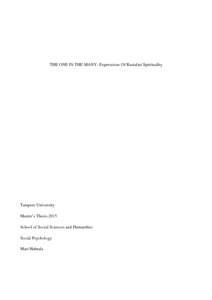The one in the many: expressions of rastafari spirituality
Huhtala, Mari (2015)
Huhtala, Mari
2015
Sosiaalitieteiden maisteriopinnot - Master's Programme in Social Sciences
Yhteiskunta- ja kulttuuritieteiden yksikkö - School of Social Sciences and Humanities
This publication is copyrighted. You may download, display and print it for Your own personal use. Commercial use is prohibited.
Hyväksymispäivämäärä
2015-03-26
Julkaisun pysyvä osoite on
https://urn.fi/URN:NBN:fi:uta-201504201308
https://urn.fi/URN:NBN:fi:uta-201504201308
Tiivistelmä
ABSTRACT This social psychological research takes interest in discovering what spirituality and the concept of oneness look like as expressed by members of the faith of Rastafari. Rastafari is a diverse social, cultural, political, cultural, and a spiritual movement that has made the concept of oneness/one love know to the world through the legendary figure of Bob Marley. This study takes a social scientific look on spirituality as lived reality and foundation for everyday life by members of Rastafari. The data in this study consist of semi-structured interviews, non-formal conversations, and speech produced and yield from the internet by members of the faith as well as field notes and text. 7 Rastafari took part in interviews, most of them Jamaican-born while 2 of them African Rastafari residing in Finland. The study is conducted and handled with an ethnographic method. The most relevant topics seen to the subject of the research are compartmentalized into themes. The themes are analyzed to form a picture of the experiences the members hold on spirituality and oneness. This phase of the process is carried out with content analysis. The study makes use of theories on spirituality and oneness. The most prominent point of reference is Kenneth Gergen s theorization on the relational nature of the self and reality. Theorizations on spirituality in research as well as outside of academia are used as important sources to contextualize and reference to in addition to the study material focused on the phenomenon of Rastafari. Spirituality and oneness are seen by the informants simultaneously other-worldly and grounded in the everyday experience and activities. The research shows that the Afro-centric phenomenon of Rastafari draws also from eastern spiritual tradition in its expression. The movement has grown from local Jamaican phenomenon to a worldwide culture and faith. The forms it takes are thus many and different. With this, the message of the movement has gone deeper from its original only African freedom cause to a spiritual path of realizing the connectivity of all irrespective of one s life story or background. While Rastafari appears as a highly communal phenomenon, it is also experienced as a deeply personal path and a process of endless transformation.
